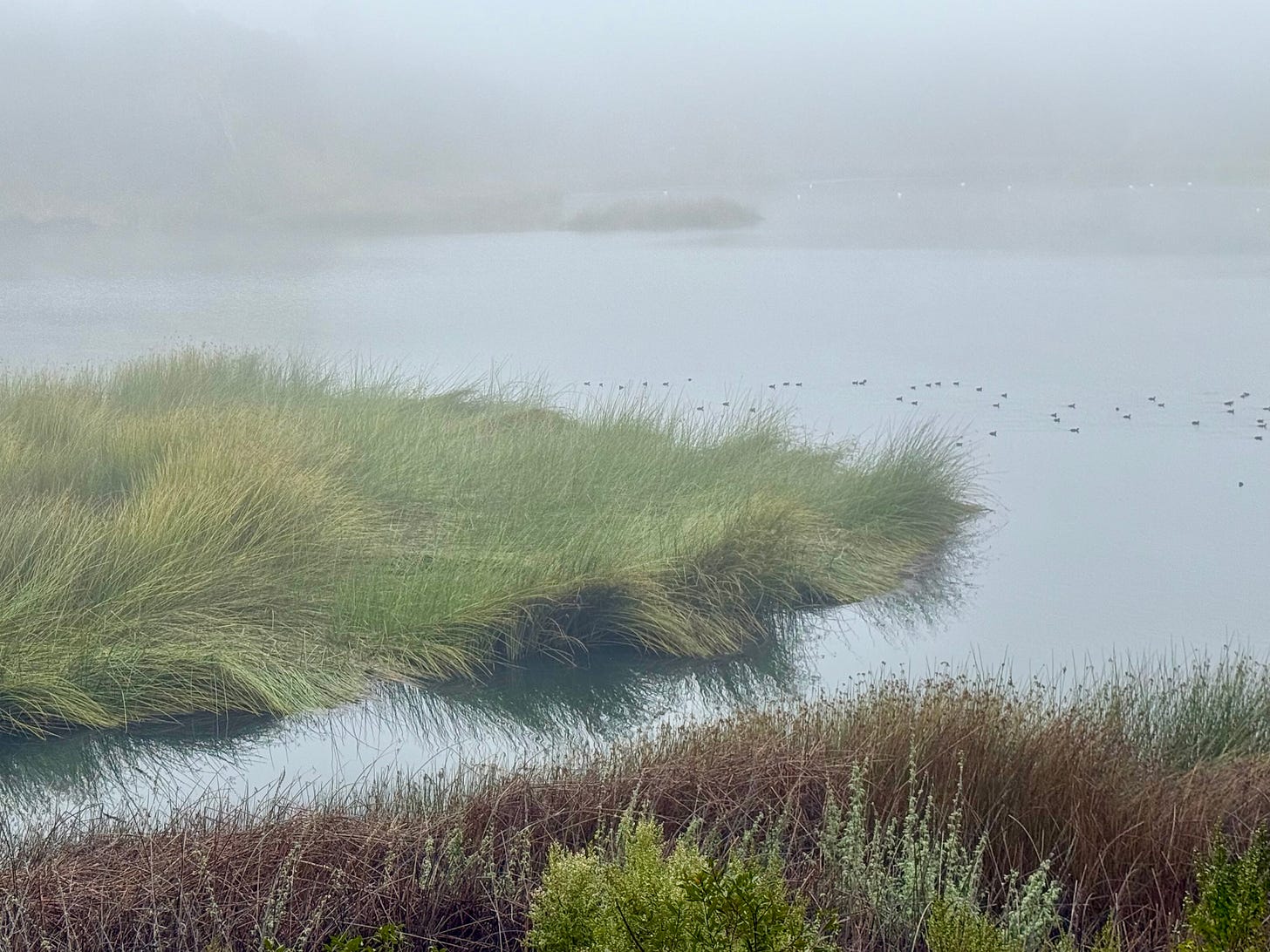Memory is one of the least understood, most complex and absolutely vital functions of the human brain. Without it we would be lost in a sea of infinite repetition, utterly bereft of forward momentum.
Wait, what did I just write?
Oh yeah, memory. I just wasn’t sure where to start. In moments of compositional doubt, I often begin with the general and move toward the particular. But in this case, let’s start with the particular.
Mary and I went for an early morning hike this past weekend with my daughter, her husband and our indefatigable 2-year-old grandson Beau. We chose a 3-mile loop around a local lake, a place that I first encountered in 1970, the year I moved from a small town in Ohio to the San Francisco Bay Area.
It was a chilly morning with a light fog, wintry and Decembrish. A few minutes after we left the parking lot we were immersed in the place. Rolling hills covered in variegated vegetation. Lush green grasses thanks to the start of rainy season. Spindly, naked trees. Massive coastal live oaks. Bent marsh grasses flowing down to the lake, whose surface was still and spectral. Everywhere the moist, breathing, hard-packed soil. Nature was in retreat just a few days before the winter solstice and yet everywhere the flora felt alive and insistent, as if in testament to William Faulkner’s declaration in his Nobel Prize address that humanity will not just endure, but prevail.
My attention was commanded by Beau, who by now was out of his stroller and running along the path, literally squealing with delight, being in that state where one is simply rolling in the fundamental thrill of existence, the interface of breath and air, the miracles of mobility and intention.
And suddenly I was seized by memory. All seemed still, outside of time. Even as I was walking beside Beau with my posse not far behind I briefly lost a sense of self and gave in to an overwhelming sense of place. The air was perfumed with musk and moisture, the limbs of the oak trees flowed into gnarly canopies adorned with emerald moss and pastel lichens. The hills rose up and away until their contours disappeared into the gray fog. I was taken back to my first encounter with this coastal geography, the memory so intense and immediate it felt like time travel. Suddenly it was a day more than 50 years ago, when I was walking a ridgeline among these same hills, also in the cool fog, immersed in the lush winter grass and the ghostly oaks. And, like Beau, reveling in my existence.
Moments like that walk from so long ago form a particular type of memory, what’s known as an engram, that moment when neurons in the hippocampus or amygdala become excited and form a local ensemble. These ensembles combine with others in other parts of the brain, such as the cortex, to create an engram complex. Engrams are like CDs — they remain stored in the brain and when a memory is recalled, they’re reactivated.
Later during our family hike, when I was recalling the memory to my daughter, I described it as almost being at the molecular level. What I had meant to say was the cellular level, a memory so strong and deep that it felt as if it had metastasized from my brain to my entire body.
What made this engram so vivid was its context. As a 17-year-old, the move from Ohio, where I had grown up, to California didn’t quite reach the level of trauma, but it was tectonic nonetheless. Everything was different, from the topography and weather to the people and the culture. It took several months for me to adjust to the novelty of it all, which was almost overwhelming. One day in January of 1971 I broke through and realized where I was. More importantly, I accepted it and, in that acceptance, opened up to it, like parched soil taking in a dense rainfall. I began to develop a sense of place, deeply and strongly.
This is what rushed back to me this past weekend walking near the lake — that initial imprint of land and air and flora, the poetry of a particular ecosystem, the sense of change and acceptance, all the things that formed a unique engram that could have been stamped Jan. 18, 1971 and was now lodged in my neurological pathways, radiating out through my entire body.
I moved to North Carolina in 2015, which was as abrupt a shift in context as California was to Ohio. But I was much older and more experienced, so I soldiered through, missing some aspects of the West Coast but enjoying aspects of my new geography, especially the marine air and the expanse of maritime marshes and forests. Still, I miss that sense of place, that neurological complex that grounds us deeply to a particular place so that every aspect of it seems familiar and knowable.
Maybe with time, in this still new place, I will regain it. Until then, memory will suffice.





What a beautiful memory you experienced. Have a wonderful, warm family holiday back in the hood.
Nicely done, Russ. And have a good holiday on the wrong coast.